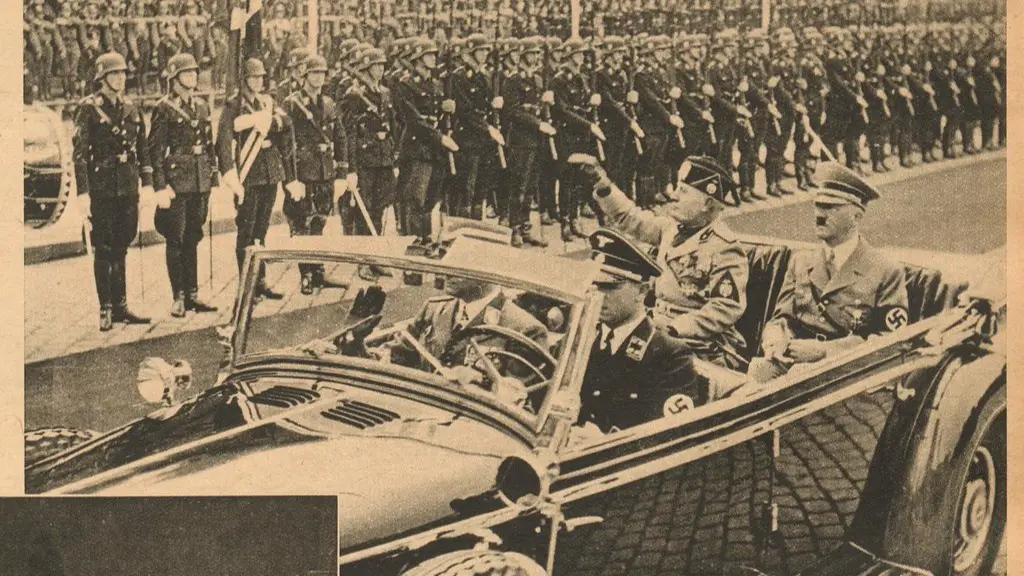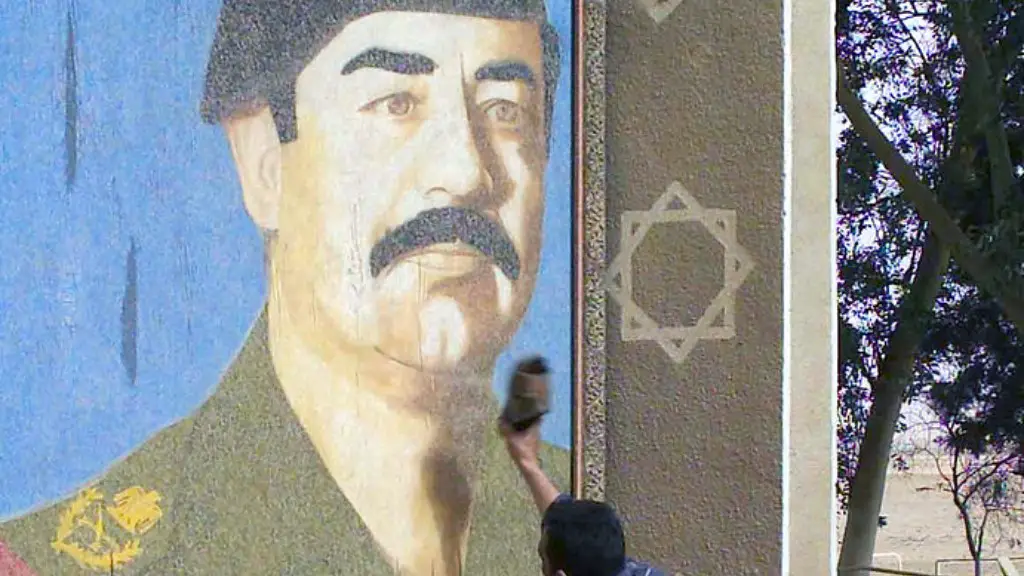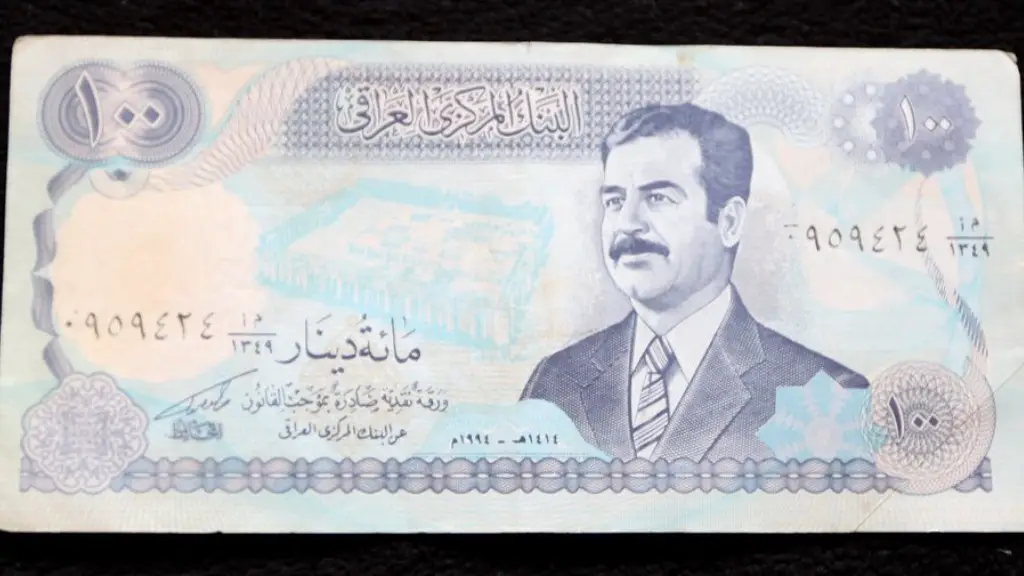Muammar Gaddafi is a highly controversial figure in modern history. Over the past four decades, his name has become synonymous with oppressive political rule and disregard for international law. From his time as a leader of Libya in the 1970s, until his death in 2011, there has been intense criticism of his policies and reign, leading to worldwide disdain for Gaddafi.
Gaddafi’s policies of authoritarian rule in Libya have led to the nation becoming isolated from much of the international community. Under Gaddafi’s rule, dissent was rarely tolerated and free speech was severely restricted. From these restrictions came accusations that Gaddafi was a dictator who was not willing to listen to the voice of his people.
In addition to his domestic rule, Gaddafi was known for supporting armed insurgencies and terrorism abroad. He was famously linked to the 1988 bombing of a Pan Am airliner over Lockerbie, Scotland, which resulted in the deaths of 270 people. He has also been linked to the funding of numerous terrorist organisations, both directly and indirectly. These actions led to many countries around the world viewing Gaddafi as a threat to global security and international peace.
International sanctions against Libya, implemented by the United Nations Security Council in 1992, further compounded anti-Gaddafi sentiment. These sanctions were intended to pressure the Libyan government to cease their support of terrorism and human rights violations, but they resulted in widespread economic hardship and deprivation for ordinary Libyans.
Gaddafi’s refusal to back down or admit to any wrongdoing earned him further criticism from the international community. His uncompromising attitude towards the rule of law eventually led to a NATO-backed military intervention which led to his downfall in 2011.
Muammar Gaddafi is widely considered to be one of the most oppressive and authoritarian rulers of the modern era. His disregard for international law, human rights and free speech earned him much criticism from both the international community and his own people. It is this disregard for the rule of law and human rights which has led to Gaddafi being one of the most hated and reviled figures in the world today.
Effects Of Gaddafi’s Rule
The rule of Gaddafi had a significant effect on the people of Libya. People suffered under restrictive laws, economic hardship and political upheaval. In addition to this, the accusations of supporting extremist organisations abroad caused Gaddafi to be viewed with suspicion in certain circles. This had a detrimental effect on the reputation of Libya as a nation and its people as a whole.
Gaddafi’s regime was also accused by the international community of numerous human rights violations, including the torture, imprisonment and killing of many opponents of his regime. It is these actions which increased the western world’s animosity towards Gaddafi and his rule.
Gaddafi’s regime also heavily suppressed freedom of expression, with the government introducing strict censorship laws which were enforced by the secret police. This meant that information regarding Gaddafi’s regime was limited, which made it difficult for the international community to access accurate reports of the situation in Libya.
Finally, Gaddafi’s regime was heavily reliant on oil wealth and was accused of using it to maintain power. This has tarnished Libya’s international reputation as a nation with money, rather than one striving for democracy.
Gaddafi’s Departure From Power
After four decades in power, Gaddafi’s rule of Libya came to an end in 2011 with NATO-backed rebels ousting him from power. The intervention was seen by many as a necessary move, as Gaddafi had become increasingly unpopular both in Libya and abroad.
Gaddafi had become notorious for his oppressive rule, human rights violations and support for terrorism. His actions also resulted in severe economic hardship for the people of Libya. This meant that by the time of his downfall, the majority of the population had come to despise Gaddafi and welcomed the end of his rule.
Gaddafi’s fall from power ultimately came too late for those who had suffered under his regime, but it was still seen as a cause for hope both for Libya and the wider international community. Gaddafi’s final days were met with celebration in the streets of Libya, a clear indication of his unpopularity.
However, the end of Gaddafi’s rule has had a lasting effect on the nation as a whole. The years of depravation and instability that followed his downfall, have meant that Libya is still struggling to rebuild itself and recover from the past forty years of his rule.
Impact of Gaddafi’s Legacy
Gaddafi’s legacy has had a profound effect on Libya and the wider world. During his four decades in power, his oppressive rule and disregard for international law tarnished Libya’s international reputation and left many feeling as though their voices were never heard.
His actions also resulted in a severe shortage of resources for the average Libyan. This has meant that the nation is still struggling to rebuild itself and is facing a number of economic and political issues.
Gaddafi’s legacy is still present in Libya today, and it is one that is still feared by many. Although he is gone, the legacy of his oppressive rule will continue to affect the nation for many years to come.
The death of Gaddafi in 2011 marked the end of an era, but it failed to bring the justice or restitution that many felt he deserved. Gaddafi’s legacy will always be tainted by the misery and suffering that he caused during his reign, and is a stark reminder of the consequences of authoritarian rule.
Conclusion Of Foreign Relations During Gaddafi’s Rule
Gaddafi’s oppressive rule and foreign policies have led to a significant deterioration in foreign relations between Libya and the rest of the world. His support for terrorism and human rights violations have made him an outcast in the international community and it is unlikely that Libya will ever be able to rebuild its reputation in the near future.
Gaddafi’s policies also led to the difficult relationship between Libya and the United States. Gaddafi’s actions led to sanctions being imposed on Libya and the two nations have been in a state of tension for many years. This tension has led to further mistrust between the two nations and is likely to continue for some time.
The death of Gaddafi in 2011 marked the end of an era, but it is unlikely that his legacy will ever be forgotten. The consequences of his rule are still felt in Libya today and his actions are still considered to be one of the greatest injustices of the modern era.
The Role Of NATO In Gaddafi’s Overthrow
Gaddafi’s ousting from power was largely due to the military intervention of NATO forces, which played a crucial role in overthrowing the dictator. The intervention was seen by many as a necessary move, as Gaddafi had become increasingly unpopular both in Libya and abroad.
The role of NATO in Gaddafi’s overthrow was controversial, with some nations criticising the use of military force to achieve a political aim. However, the majority of the international community welcomed the intervention as it marked the end of an oppressive regime and allowed Libya to start rebuilding itself with a fresh start.
The aftermath of the NATO intervention was highly unpredictable, and it has had a significant impact on Libya’s future. It is still unclear whether the intervention will lead to a prosperous future for Libya, or if it will deepen the nation’s existing economic and political issues.
The role of NATO in Gaddafi’s overthrow will continue to be debated for many years to come, with some arguing that it was a step in the right direction and others believing that it only deepened the problems that Libya was already facing.
Assessment Of The Role Of The International Community During Gaddafi’s Rule
The actions of Muammar Gaddafi during his rule of Libya were strongly condemned by the international community. However, many argue that the international community’s response was too little, too late, as Gaddafi was able to maintain his rule for four decades without facing any real consequences.
The actions that the international community did take were largely limited to sanctions, which imposed economic hardship on the Libyan people, rather than have any tangible effect on Gaddafi’s rule. This has led to criticisms that the economic consequences of the sanctions outweighed the benefits.
The international community was also accused of not doing enough to pressure Gaddafi to cease his support of terror groups and human rights violations. The international community failed to take meaningful action against Gaddafi and this has been viewed as a failing of the global community as a whole.
Whilst the international community was right to condemn Gaddafi’s actions, it appears that they did not go far enough in attempting to bring an end to his rule. This meant that Gaddafi was not held accountable for his actions and his legacy has blighted Libya for decades.
The Role Of The United Nations During Gaddafi’s Rule
The United Nations took an active role in addressing the issues of the Gaddafi regime during his rule. The UN Security Council implemented sanctions against Libya in 1992, which aimed to pressure Gaddafi to cease his support of terrorism. The UN also imposed an arms embargo on the country and various other restrictions on foreign travel.
In addition, the UN set up international monitoring teams in Libya to oversee human rights abuses, and issued numerous resolutions condemning Gaddafi’s actions. These actions, although not overly effective, showed the commitment of the UN to hold Gaddafi accountable for his actions.
The UN also played a key role in the NATO-backed intervention which overthrew Gaddafi in 2011. The UN provided support for the intervention, and subsequently recognised the new government which was formed. The UN also provided aid and assistance to Libya in the aftermath of the intervention.
The role of the UN during Gaddafi’s rule was controversial, with some arguing that it did not go far enough in addressing the issues of the Gaddafi regime. Whatever the opinion, the UN’s support and action against Gaddafi showed its commitment to bring an end to the oppressive rule.



